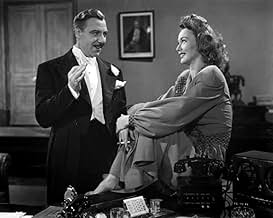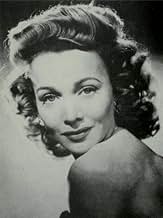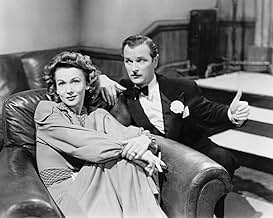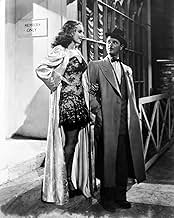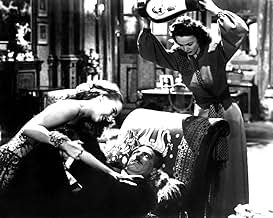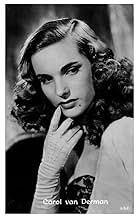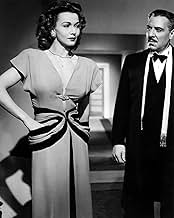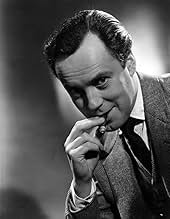In post- WW2 Britain, an American fashion journalist, her ex-army fiancé, and a gang of honest toughs from a local gym attempt to bring black market organized crime to justice.In post- WW2 Britain, an American fashion journalist, her ex-army fiancé, and a gang of honest toughs from a local gym attempt to bring black market organized crime to justice.In post- WW2 Britain, an American fashion journalist, her ex-army fiancé, and a gang of honest toughs from a local gym attempt to bring black market organized crime to justice.
Carol van Derman
- Mercia Lane
- (as Carol Van Derman)
Featured reviews
Edmond Greville brought a gallic sensibility to this vivid evocation of the postwar days when Soho was a byword for criminality and vice, fluidly photographed by Hone Glendinning and ending in a slam-bang finale.
Obligatory American imports Joseph Calleia and Carole Landis both give excellent accounts of themselves as "the nastiest thug in Europe" and his nemesis "the best fashion editor in the business". A uniformly memorable supporting cast include Nigel Patrick in full-on spiv mode, John Salew as Patrick's perspiring courier rejoicing in the name 'Greasy', and Hay Petrie in his creepiest role since he played Quilp as a murderous henchman known only as 'The Barber'.
Obligatory American imports Joseph Calleia and Carole Landis both give excellent accounts of themselves as "the nastiest thug in Europe" and his nemesis "the best fashion editor in the business". A uniformly memorable supporting cast include Nigel Patrick in full-on spiv mode, John Salew as Patrick's perspiring courier rejoicing in the name 'Greasy', and Hay Petrie in his creepiest role since he played Quilp as a murderous henchman known only as 'The Barber'.
Tangy post-War British 'Spiv' movie (a cycle of films with roots in 30s American Gangster movies, featuring characters profiting from wartime rationing in a similar fashion to 30s bootleggers, but not so clearly glamorised as their Stateside equivalents). Directed by Edmond T. Greville (BEAT GIRL aka WILD FOR KICKS), and adapted from a stage play, this features Carole Landis (in one of her final roles) as nosy reporter Linda Medbury who, together with her ex-commando boyfriend Jumbo Hoyle (played by Derek Farr), gets on the trail of a gang of post-war black marketeers headed by Soho nightclub owner Sugiani, played by Joseph Calleia (whose role was based on a real-life Post-war London criminal). This gets them mixed up with London 'Spiv' Bar Gorman, played by Nigel Patrick, whose slangy, comic performance almost overshadows the surrounding film. Imaginatively shot, speedily paced, and ripe with post-War vernacular and the requisite criminal dust-ups (primarily involving the good guys' recruited gang of boxers, market porters, and cab drivers versus the low-life criminals), this is an entertaining slice of British crime and deserves to be better known, as it's worthy of a place alongside such noted post-War British crime movies as BRIGHTON ROCK and NIGHT AND THE CITY. Check it out, if you get the chance.
Joseph Calleia and Nigel Patrick have built up a massive and occasionally underworld organization. When one of their murders comes to the attention of reporter Carole Landis, she begins a series of newspaper articles. Their increasingly threatening reaction does not faze her, but it leads her boyfriend, Derek Farr, into organizing an armed rebellion. In the meantime, slogging police inspector Stanley Holloway is closing in from his own end.
The script is by Richard Llewellyn, based on his stage play. It's been properly opened up for the screen. The problem is that it's shifting tone, from comedy to drama, never quite works. Joseph Calleia, fine actor that he is, is saddled with a heavy accent and tries to be simultaneously funny and terrifying. Patrick's character spends a lot of time as a fast-talking Cockney, more interested in performing his comedy bits on the telephone, until he decides to suddenly take matters into his own hands and take charge.
The result is a movie that is never quite sure what it wants to be, and tries to distract the audience from that uncertainty.
The script is by Richard Llewellyn, based on his stage play. It's been properly opened up for the screen. The problem is that it's shifting tone, from comedy to drama, never quite works. Joseph Calleia, fine actor that he is, is saddled with a heavy accent and tries to be simultaneously funny and terrifying. Patrick's character spends a lot of time as a fast-talking Cockney, more interested in performing his comedy bits on the telephone, until he decides to suddenly take matters into his own hands and take charge.
The result is a movie that is never quite sure what it wants to be, and tries to distract the audience from that uncertainty.
The Silk Noose, or Noose, as it is also known, from 1948 is a British film starring Carole Landis as a fashion writer for a newspaper.
It's post-war Britain, and despite the war being over, there are many items that are hard to get. An Italian black market racketeer, Sugiani (Calleia) runs an operation in black market goods. So far, the police haven't been able to get them.
A fashion writer, Linda Medbury (Landis), is determined to bring down the gang, although her publisher would rather she stick to clothes. The front for the group, The Blue Moon Club, winds up with a corpse, which sends Linda's reporter tentacles high.
Linda finds herself in danger as does her source. Her fiance is determined to protect her and bring down Sugiani at the same time. It won't be easy.
Sometimes this film seemed like a comedy, particularly with the rapid fire dialogue of Nigel Patrick as a cohort of Sugiani's, and a woman losing her dress toward the end of the film. The last twenty or so minutes has a lot of action.
This was the beautiful Landis' second-last film. What a waste of talent. She gives a vivacious, likeable performance here. Unfortunately, her career fell on hard times when she ended her relationship with Darryl F. Zanuck. Unhappy with her career and misguided in her search for love, she committed suicide. Life in Hollywood for a woman was always extremely difficult, and she was one of its victims.
It's post-war Britain, and despite the war being over, there are many items that are hard to get. An Italian black market racketeer, Sugiani (Calleia) runs an operation in black market goods. So far, the police haven't been able to get them.
A fashion writer, Linda Medbury (Landis), is determined to bring down the gang, although her publisher would rather she stick to clothes. The front for the group, The Blue Moon Club, winds up with a corpse, which sends Linda's reporter tentacles high.
Linda finds herself in danger as does her source. Her fiance is determined to protect her and bring down Sugiani at the same time. It won't be easy.
Sometimes this film seemed like a comedy, particularly with the rapid fire dialogue of Nigel Patrick as a cohort of Sugiani's, and a woman losing her dress toward the end of the film. The last twenty or so minutes has a lot of action.
This was the beautiful Landis' second-last film. What a waste of talent. She gives a vivacious, likeable performance here. Unfortunately, her career fell on hard times when she ended her relationship with Darryl F. Zanuck. Unhappy with her career and misguided in her search for love, she committed suicide. Life in Hollywood for a woman was always extremely difficult, and she was one of its victims.
Note: this is a review for the full-length UK version of this film entitled NOOSE.
It is always a pleasure to see a film noir that is not only entertaining, artistically satisfying and a little off-beat, but one that is little heard of. NOOSE, a British film from 1948, has many of the visual and plot elements of the American crime dramas made in the forties, and this one even features, unexpectedly, two American stars, Carole Landis and Joseph Calleia. Landis is a fashion reporter who, after getting a story from a girl who is later murdered, wants to get the goods on the man responsible for her death, a notorious and powerful black marketeer, even when she learns that it will entail personal danger to her. She is supported by her newly demobbed fiancé, who enlists a gang of toughs from the local gym to try to bring down the racketeer's empire. Quite a ride from here. --- The story was based on a play by Richard Llewellyn (noted for HOW GREEN WAS MY VALLEY), but it betrays little of its non-cinematic origins. Director Edmond Greville (a French-English director who began his career working with Abel Gance and ended it with the sleaze classic BEAT GIRL) lends the film considerable artistic flare -- the staging and camera angles will often surprise you; so much so that you sometimes believe you are watching an auteur film. Music is by the great Charles Williams (Dream of Olwen, Theme from the APARTMENT) and adds to the film. The cast is a standout, even though it occasionally seems to work to cross purposes. Carole Landis, who made her last two films in England, was not only an actress, but a singer, USO trouper, and baseball fan (her name came from Commissioner Kennesaw Mountain Landis!). Her career was lamentable spotty and her personal life a disaster, but she was a delight and it is a pity that shortly after this film she supposedly committed suicide (or, as some believe, was done in or something by her married boyfriend Rex Harrison.) Here she is vivacious and gives a performance well beyond that of the usual wise-cracking girl reporter. Derek Farr, always competent, seems bland by comparison and their pairing seems odd -- but the War did produce some odd couples. Joseph Calleia, originally Maltese, was a fixture in Hollywood during the forties and early fifties playing villains in gangster pictures and Westerns. As the kingpin black marketeer of foreign extraction he is simply superb, a performance Edward G. could not have bettered. Rivaling him for film time and stealing all his scenes, though, is Nigel Patrick as the flamboyant Cockney spiv who works for him. Stanley Holloway, known for comedic parts (LAVENDER HILL MOB, MY FAIR LADY) has an unusual dramatic turn as a policeman. --- This film is intriguing and eminently worth seeing, probably more than once, although, on the negative side, it is marred by an unevenness in tone, inconsistent pacing, and editing that disrupts the smooth telling of the story. -- also a few loose ends, such as what was the significance of Carole's character constantly taking her shoes off? Nevertheless, highly recommended for film noir fans!
It is always a pleasure to see a film noir that is not only entertaining, artistically satisfying and a little off-beat, but one that is little heard of. NOOSE, a British film from 1948, has many of the visual and plot elements of the American crime dramas made in the forties, and this one even features, unexpectedly, two American stars, Carole Landis and Joseph Calleia. Landis is a fashion reporter who, after getting a story from a girl who is later murdered, wants to get the goods on the man responsible for her death, a notorious and powerful black marketeer, even when she learns that it will entail personal danger to her. She is supported by her newly demobbed fiancé, who enlists a gang of toughs from the local gym to try to bring down the racketeer's empire. Quite a ride from here. --- The story was based on a play by Richard Llewellyn (noted for HOW GREEN WAS MY VALLEY), but it betrays little of its non-cinematic origins. Director Edmond Greville (a French-English director who began his career working with Abel Gance and ended it with the sleaze classic BEAT GIRL) lends the film considerable artistic flare -- the staging and camera angles will often surprise you; so much so that you sometimes believe you are watching an auteur film. Music is by the great Charles Williams (Dream of Olwen, Theme from the APARTMENT) and adds to the film. The cast is a standout, even though it occasionally seems to work to cross purposes. Carole Landis, who made her last two films in England, was not only an actress, but a singer, USO trouper, and baseball fan (her name came from Commissioner Kennesaw Mountain Landis!). Her career was lamentable spotty and her personal life a disaster, but she was a delight and it is a pity that shortly after this film she supposedly committed suicide (or, as some believe, was done in or something by her married boyfriend Rex Harrison.) Here she is vivacious and gives a performance well beyond that of the usual wise-cracking girl reporter. Derek Farr, always competent, seems bland by comparison and their pairing seems odd -- but the War did produce some odd couples. Joseph Calleia, originally Maltese, was a fixture in Hollywood during the forties and early fifties playing villains in gangster pictures and Westerns. As the kingpin black marketeer of foreign extraction he is simply superb, a performance Edward G. could not have bettered. Rivaling him for film time and stealing all his scenes, though, is Nigel Patrick as the flamboyant Cockney spiv who works for him. Stanley Holloway, known for comedic parts (LAVENDER HILL MOB, MY FAIR LADY) has an unusual dramatic turn as a policeman. --- This film is intriguing and eminently worth seeing, probably more than once, although, on the negative side, it is marred by an unevenness in tone, inconsistent pacing, and editing that disrupts the smooth telling of the story. -- also a few loose ends, such as what was the significance of Carole's character constantly taking her shoes off? Nevertheless, highly recommended for film noir fans!
Did you know
- Trivia"Noose" was filmed in England during January and February of 1948. This was the final movie Carole Landis made before her death.
- ConnectionsFeatured in My Journey Through French Cinema (2016)
- SoundtracksWhen Love Has Passed You By
Composed by Edward Dryhurst
Lyrics by Barry Gray and Jean Cavall
Performed by Olive Lucius (uncredited)
Details
- Release date
- Country of origin
- Languages
- Also known as
- Die seidene Schlinge
- Filming locations
- Warner Brothers First National Studios, Teddington Studios, Teddington, Middlesex, England, UK(studio: made at Warner Bros. First National Studios, Teddington, England.)
- Production companies
- See more company credits at IMDbPro
- Runtime
- 1h 12m(72 min)
- Color
- Aspect ratio
- 1.37 : 1
Contribute to this page
Suggest an edit or add missing content

